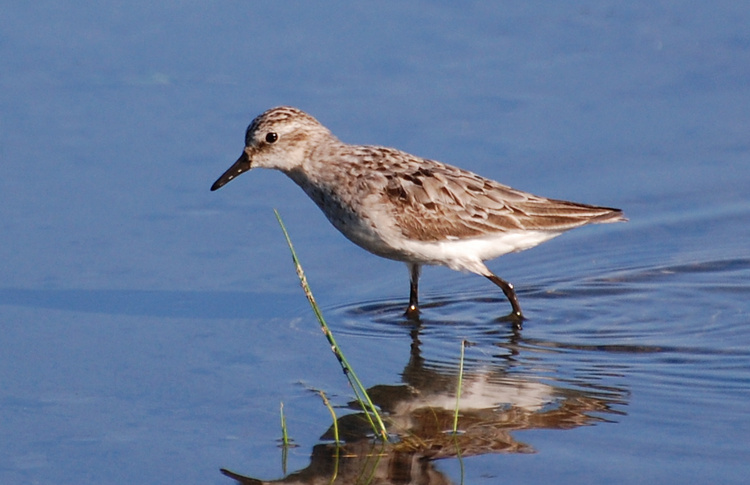
A present-day interlude
July 15th, 2010
So, remember how I said sandpipers migrate really early?

Least Sandpiper
Low water levels on the Ottawa River have left behind extensive mud flats. This is great news for those of us who want to go shorebird-watching in late summer. Sandpipers and plovers are attracted to that kind of habitat, sometimes in large flocks. And even though it's only mid-July, the first wave of migrants shorebirds is now moving through.
At Andrew Haydon Park yesterday, a flock of several dozen Least Sandpipers was foraging in the mud and shallow water. This is one of an informal class of birds known as the "peeps": very small (sparrow-sized), very cute sandpipers that can be hard to distinguish from each other. Least Sandpipers are the easiest of them. They're the only ones (in our area) with yellow legs instead of black ones.

A few Semipalmated Sandpipers were mixed in with the flock. They're a little grayer and a shade bigger, but leg color is the most reliable difference.
Other early migrants included one Semipalmated Plover and one Lesser Yellowlegs, along with the usual, locally breeding Spotted Sandpipers and Killdeers. The Killdeers did the best they could to alarm everyone about my presence ("it's a human! it's a human! it's a human! it's a human! watch out! watch out! watch out!" Hey guys? Shut up.), but, I'm happy to say, none of the peeps got particularly alarmed. They allowed me to approach within ten feet of them and paid me little mind. Such tameness is typical of birds who breed in the far north, which many sandpipers do.
I went back today with camera in hand and got the above photos, but found, to my dismay, that the shorebird habitat at Andrew Haydon was getting swallowed up: the water level was rising. And I heard from a fellow birder yesterday that it had risen between then and the day before. This seems to happen to us every year. Just when it's getting good, boom, the river rises, the mud disappears, shorebirds go elsewhere. (Like to sewage lagoons for instance. I'm sorry, I may be a pretty insanely enthusiastic bird-watcher, but I'm not insane enough for that yet.) To mangle one of Jack Sparrow's favorite lines: "why is the mud always gone?"
The extensive shallows still make it easier to explore that stretch of river than it usually is, provided you have a good set of waterproof hiking boots and are willing to wade through muddy, buggy vegetation. If I did what I did today back in Virginia I'd've probably come back with tick bites, chigger bites, and furthermore dead because I'd have gotten bit by a water moccasin. There are advantages to living in the north.
July 15th, 2010
So, remember how I said sandpipers migrate really early?

Least Sandpiper
Low water levels on the Ottawa River have left behind extensive mud flats. This is great news for those of us who want to go shorebird-watching in late summer. Sandpipers and plovers are attracted to that kind of habitat, sometimes in large flocks. And even though it's only mid-July, the first wave of migrants shorebirds is now moving through.
At Andrew Haydon Park yesterday, a flock of several dozen Least Sandpipers was foraging in the mud and shallow water. This is one of an informal class of birds known as the "peeps": very small (sparrow-sized), very cute sandpipers that can be hard to distinguish from each other. Least Sandpipers are the easiest of them. They're the only ones (in our area) with yellow legs instead of black ones.

A few Semipalmated Sandpipers were mixed in with the flock. They're a little grayer and a shade bigger, but leg color is the most reliable difference.
Other early migrants included one Semipalmated Plover and one Lesser Yellowlegs, along with the usual, locally breeding Spotted Sandpipers and Killdeers. The Killdeers did the best they could to alarm everyone about my presence ("it's a human! it's a human! it's a human! it's a human! watch out! watch out! watch out!" Hey guys? Shut up.), but, I'm happy to say, none of the peeps got particularly alarmed. They allowed me to approach within ten feet of them and paid me little mind. Such tameness is typical of birds who breed in the far north, which many sandpipers do.
I went back today with camera in hand and got the above photos, but found, to my dismay, that the shorebird habitat at Andrew Haydon was getting swallowed up: the water level was rising. And I heard from a fellow birder yesterday that it had risen between then and the day before. This seems to happen to us every year. Just when it's getting good, boom, the river rises, the mud disappears, shorebirds go elsewhere. (Like to sewage lagoons for instance. I'm sorry, I may be a pretty insanely enthusiastic bird-watcher, but I'm not insane enough for that yet.) To mangle one of Jack Sparrow's favorite lines: "why is the mud always gone?"
The extensive shallows still make it easier to explore that stretch of river than it usually is, provided you have a good set of waterproof hiking boots and are willing to wade through muddy, buggy vegetation. If I did what I did today back in Virginia I'd've probably come back with tick bites, chigger bites, and furthermore dead because I'd have gotten bit by a water moccasin. There are advantages to living in the north.
| ← | → |
